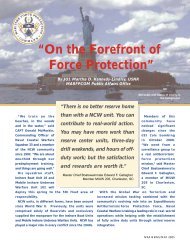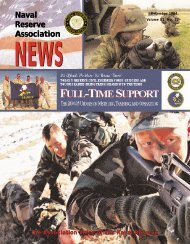ProfessionalDevelopmentHow Long Is “Too Long”?CAPT Larry Weill, USNNational VP for Professional DevelopmentIremember standing outside ofthe National Defense Universityone afternoon as I congratulateda young lieutenant on her selectionto LCDR. As she discussed hercareer milestones, she made apassing remark about her collateralduties in her current unit that she hadperformed as an ensign. My curiosityarose; and I asked her the question,“How many tours have you had in thisunit?”, to which she answered, “One!”She had been in the same unit for thepast eleven years! It was only a credit toher outstanding service and hard workthat she had been promoted to O-4, andI worried about her prospects for furtherpromotion.This brings me to the topic of thismonth’s column: homesteading andcareer growth. We have all heard aboutthis thing called homesteading, which isthe long (and sometimes VERY long)tenure of an officer in a single unit.What is it, and why is it bad for a youngcareer? Let’s talk about that some.First of all, the APPLY Board had avery good idea when they decided on thestandard noncommand tour tenure ofthree years. Three years is about thelongest that a senior officer shouldremain in any one billet to remaincompetitive. For a junior officer, thatperiod might be a little longer, but nevermore than about three and a half years.For an officer to spend longer in onelocation not only limits his or her experienceto one small niche, but also indicates tothe promotion board that he/she is afraidof growth, of taking risks, and of assuminggreater responsibilities.Each year, about a half dozen juniorofficers write to me and ask the samequestion: “I’ve been in the same unit forsix years now. I spent two years as aDivision Officer, then I was the AdminOfficer, and then they made me theTraining Officer. Should I stay in theunit if I have a chance at becoming thenext XO?” My answer would generallybe, “No.” First of all, six years is alreadyway too long, and most promotion boardswill look at that factor in a negativelight. That being said, it is a good thingthat they have moved up within their unitstructure. Going from a Division Officerto a Department Head to XO shows thatthey are making progress and handlingtheir responsibilities well. However, Iwould advise that officer to seek anequal position (XO) inside of anotherunit rather then remain in his/her currentunit. (Or, accept the XO job untilanother XO position comes open; then,transfer.)The Commanding Officer should beon top of this process and should play amajor role in limiting the tour length ofhis or her officers. The first step is thatthey should know how long each of theirofficers have served in that unit andwhen they plan to transfer. This shouldbecome a part of every FITREP counselingsession, including the semiannual review.In many cases, junior officers knowwhen they arrived but will admit thatthey never thought about their plans fortransferring. Help them to get started inthis process. Counsel them on thenegative aspects of homesteading. Makethem think about other units, other jobs,and other opportunities.Sometimes this process can seem to becounterproductive to the good of theunit. Think about it. Many units have a“Lieutenant ‘5.0’ Do Right” who has beenin the unit for three years and who knowsit all. He or she has been to the supportedcommand many times, and they lovehim/her. He/she knows all the contacts,can fill out any of the forms, and couldprobably take over as CO if needed.Yes, it is hard to lose someone like that.But, improbably as it sounds, others willstep up and quickly fill his/her shoes.(Especially if he/she has been doinghis/her job and training others.) By nottransferring that officer, not only areyou limiting his/her career, but also youare not encouraging others in your unitto attain those same levels of proficiency.Sometimes, the junior officer may notwant to transfer; and, in those cases you(as CO) need to offer more “incentive.”Let him/her know that he/she will notbenefit from another year in the unit(including his/her FITREP!); and, then, keepyour eyes open for good opportunities.Use your own CO network to find possibleXO jobs that are opening. Introducehim/her to new possibilities, even if it meanstraveling as a JO.Finally, as advice to the junior officerwho has “settled in” to the same job orduties for more than one-to-two years, Iurge you to try something new that willprovide you with growth opportunities.I know that this means leaving thatcocoon of safety, but it is something thatyou MUST do if you are to continuegrowing as an officer. Take on a job atthe next level up the org chart. Stretchand expand your horizons. And remember:if the shoe fits, there’s no room forgrowth.VISIT OUR NEW WEB SITE ATwww.navy-reserve.org12 NRA NEWS/APRIL 2007
Sustaining the <strong>Reserve</strong>sAs the nation enters the fifthyear of the war in Iraq, the<strong>Reserve</strong> Component hasmore than answered thechallenge of serving aspart of the operationalmilitary. Looking to the future, the challengeis making sure the Navy <strong>Reserve</strong> and the other<strong>Reserve</strong> Components have the resources andsupport to sustain themselves into the futurewhile serving as part of the operational force.No one can predict the future, but it is clearthe United States faces a very challengingsecurity environment that is unlikely tostabilize significantly for years to come. Notonly must the military, active and reserve, beable to conduct ongoing operations, but alsoit must be prepared for the unexpected. What ifa conflict broke out on the Korean peninsula?What if radical Islamic fundamentalistsassassinated President Musharraf of Pakistan,a nuclear-armed state? In order to meet today’smilitary challenges and be prepared forwhat might happen, the Navy <strong>Reserve</strong> and theother <strong>Reserve</strong> Components will have tocontinue to serve as part of the operationalmilitary. Five years into what some call the“operational reserve” paradigm, the strains onSailors, their families, and their employersare showing. Fortunately, the Department ofDefense is now taking steps to make the“operational reserve” paradigm more sustainableover time, but more needs to be done.Shortly after becoming the new Secretaryof Defense, Robert Gates announcedimportant changes that seek to ensurethat as DoD continues operations in Iraq andAfghanistan, it does not “break” the <strong>Reserve</strong>sand National Guard. Limiting total mobilizationtime to one year or less; reemphasizing thatDoD’s goal is to give Sailors at least fiveyears at home for every one year at sea oroverseas; and providing financial compensationfor those Sailors whose mobilizations areextended, or who are called up morefrequently than envisioned, will help giveSailors more predictability, make it easier forfamilies and employers to support continuedservice in the Navy <strong>Reserve</strong>, and ensureSailors are compensated fairly for theirservice and sacrifice. Secretary Gates alsoannounced that DoD will expand thesize of the active Army and Marine Corpssignificantly. This expansion should reducethe pressure on the <strong>Reserve</strong> Component inthe mid- to long-term, and should eventuallyreduce the need to call up Sailors for “in lieuof ” assignments – ashore jobs that normallywould be filled by the Army and Marines.Even with these important changes,sustaining the Navy <strong>Reserve</strong> and the other<strong>Reserve</strong> Components under the “operationalreserve” will remain a challenge. As theCongressional Commission on the NationalGuard and <strong>Reserve</strong>s said in its recent report,recruiting and retention over the long term“remains highly problematic.” Particularlyfor the Navy <strong>Reserve</strong>, which has fallennoticeably short of its recruiting targets inrecent years, will the recent policy changeshelp make joining more attractive? Will theyhelp the Navy <strong>Reserve</strong> retain skilled, experiencedSailors? Only time will tell. To furtherstrengthen retention, DoD should expand jointprofessional military educational opportunitiesfor Sailors and increase the number of reserveassignments that qualify for joint credit, whichwould make Sailors more competitive forpromotion over the duration of their careers.Finally, the Navy and her sister Serviceswill not be able to sustain their <strong>Reserve</strong>Components under the “operational reserve”paradigm if there is insufficient supportfrom families and employers for service as acitizen-soldier. The Department of Defenseneeds to do more to strengthen familysupport programs. Volunteers cannotcarry the bulk of the burden indefinitely.Employer support is also critical, but moreoutreach is needed to employers to give themas much predictability as possible aboutwhen their Sailors are going to be mobilized,and for how long.The list of changes that must be made tomake the “operational reserve” paradigmsustainable is a long one – much longer thancan be covered in this column. Some changesthat were overdue are finally being made,such as limiting the length of involuntarydeployments; but others are still on the “todo” list. It will take the focused attention ofnot only DoD, but also Congress and theAmerican public to make sure the Navy<strong>Reserve</strong> and the other <strong>Reserve</strong> Componentsget the support they need to be able to serveas they have since the 9/11 attacks.GuestColumnChristine E. WormuthCenter for Strategicand International Studies,Principal Author of The Futureof the National Guard and <strong>Reserve</strong>sThe Center for Strategicand International Studies(CSIS) seeks to advanceglobal security and prosperityin an era of economicand political transformationby providing strategic insightsand practical policysolutions to decision makers.CSIS serves as a strategicplanning partner for thegovernment by conductingresearch and analysisand developing policyinitiatives that look intothe future and anticipatechange.http://www.csis.orgNRA NEWS/APRIL 2007 13
















